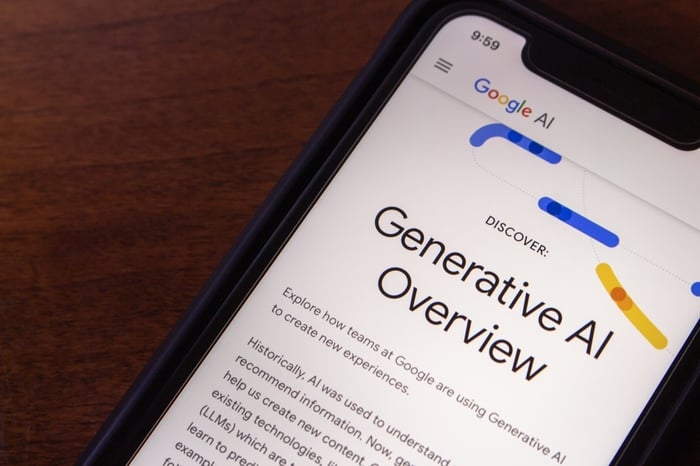Table of Contents
- Introduction
- What is Google's AI Overview?
- The Impact of AI Overview on SEO for Doctors
- Case Study Insights: What the Data Reveals About AI's Impact
- What Doctors Should Do Right Now to Stay Competitive
- The Road Ahead: Where Is This All Going?
- Final Thoughts - Adapt Early, Win Big in an AI-Driven Search World
- Frequently Asked Questions (FAQs)
How Google’s AI Overview Is Redefining SEO for Doctors in 2025

The way patients search for healthcare is undergoing one of the most significant transformations since the dawn of Google itself. Since March 2025, AI Overviews have grown by 115%, rapidly reshaping the online presentation of medical information.
Not long ago, a simple search for "orthopedic specialist near me" or "treatment for bunion pain" would deliver a list of websites, local results, and ads for patients to explore.
Today, many of those answers appear instantly in a new format: Google's AI Overview—an AI-generated summary that sits prominently at the top of search results.
This isn't just a minor tweak to the algorithm. It illustrates a fundamental shift in how patients discover, evaluate, and select healthcare providers.
Google is no longer just pointing users to your site—it's answering their questions directly, often without requiring them to click anywhere else.
For healthcare providers, this shift poses both a challenge and an opportunity. How do you ensure your practice remains visible to potential patients when Google curates the answers? And what does this mean for SEO for doctors, a cornerstone of digital marketing for medical practices?
Crafted by the experts at PracticeBeat, this blog dives into the rise of Google's AI Overviews, reveals what our latest data shows about their impact, and shares actionable strategies to help you stay ahead of the competition.
What Is Google's AI Overview, and Why Should Doctors Care?
Google's AI Overview, part of its Search Generative Experience (SGE), is transforming how patients find and evaluate medical information online. Instead of delivering a simple list of search results, Google now uses artificial intelligence (AI) to generate concise, conversational summaries directly at the top of the page.
 How AI Overviews Work (and Why They're a Game-Changer for SEO for Doctors)
How AI Overviews Work (and Why They're a Game-Changer for SEO for Doctors)
Consider a patient searching for "best treatment for bunion pain":
- Before AI Overviews: Patients browse through a mix of websites, local listings, and maybe a blog written by a podiatrist.
- Now: Google's AI instantly delivers a summary—often pulling data from high-authority healthcare sites—with selective links included underneath.
For doctors and medical practices, this shift has massive implications for healthcare search engine optimization (SEO):
Why Doctors Should Care About Google's AI Overviews

1. Declining Click-Through Rates to Websites
Patients can now get answers without leaving Google. These "zero-click searches" mean fewer visits to your site—even if your content helped train the AI. This underscores the need to integrate SEO for doctors to boost visibility within AI results, not just ranking traditionally.
2. Competition for Authority
Only sources that meet Google's standards for E-E-A-T in healthcare content (Experience, Expertise, Authority, and Trust) are selected for AI Overviews. To compete, your practice needs:
- Author bios and credentials on medical content.
- HIPAA-compliant SEO practices ensure data security.
- Schema markup for medical websites so Google can easily interpret and feature your content.
3. The Local SEO Factor
AI Overviews often integrate Local Pack results, meaning a well-optimized Google Business Profile (GBP), consistent NAP (Name, Address, Phone), and patient reviews are now critical to appearing in AI-driven recommendations.
4. Risk of Misinformation and Patient Trust
AI-generated health answers aren't flawless - health-related AI summaries carry potential risks. If patients rely on incomplete or incorrect information, they might enter your office skeptical or misinformed. Being part of these AI-curated answers allows you to control the narrative and reinforce patient trust in credible medical advice.
Worried your practice might be invisible in Google's AI Overviews?
Get a free PracticeBeat Search Visibility Assessment to see how your content, local profile, and reputation stack up—and what it will take to secure your spot in AI-driven results.
Request Your Free Assessment
What Doctors Should Do Right Now to Stay Competitive

The data is clear: SEO for doctors is no longer just about "ranking #1 on Google." In an era of AI Overviews and zero-click search results, you need to be present, authoritative, and trusted everywhere patients look. Here's how to future-proof your strategy:
1. Double Down on Local SEO
AI Overviews frequently pull data from Google Business Profiles (GBPs) and Local Packs, meaning your local presence is often the first (and sometimes only) impression patients get.
- Claim and optimize your GBP: Ensure accurate NAP (Name, Address, Phone), business hours, and service details. Add photos, videos, and FAQs.
- Generate consistent reviews: PracticeBeat client sites have demonstrated that volume and recency directly impact visibility in AI-driven results.
- Use location-specific content: Create dedicated pages for each service area and specialty.
2. Optimize for AI-Friendly Content
AI Overviews select content that's structured, credible, and user-focused.
- Implement schema markup: Use structured data for FAQs, services, conditions, and providers.
- Write for patients, not just search engines: PracticeBeat Client's visibility surge (+196% YoY impressions) shows that patient-centric, informative content drives AI recognition.
- Showcase expertise (E-E-A-T): Include author bios, credentials, and cite authoritative medical sources (e.g., Mayo Clinic, NIH).
3. Track & Adapt with Data
Search behavior is shifting—your analytics should too.
- Monitor impressions vs. clicks: If impressions are rising but clicks are flat, AI Overviews may be capturing traffic.
- Identify intent shifts: Are patients searching more symptom-based queries? Are "near me" searches driving traffic? Adjust your content accordingly.
- Leverage integrated platforms: Tools like PracticeBeat combine SEO, reputation, and analytics, giving you a holistic view of performance.
4. Build a Strong Online Reputation
Reputation isn't just for patient trust—it's a ranking factor.
- Request reviews consistently: Set up automated, HIPAA-compliant review requests to follow up after appointments.
- Respond to every review: Engagement signals to Google that your practice is active and patient-focused.
- Showcase testimonials: Feature reviews and case studies on your website and social channels.
Ready to future-proof your practice's online presence?
Schedule a free 1:1 consultation with a PracticeBeat expert to uncover where you stand in AI-driven search—and get a personalized roadmap to stay ahead.
Book Your Free Consultation
The Road Ahead: Where Is This All Going?

Google's AI Overview is not a passing experiment—they're the future of search. The way patients discover healthcare providers is undergoing a fundamental evolution, and the next 12–18 months will bring even more change.
1. The Rise of "Zero-Click" Searches
Patients will increasingly get what they need—answers, recommendations, even provider options—without ever visiting a website. Symptom lookups, treatment questions, and "near me" searches will often be satisfied entirely within AI-generated results.
What this means for doctors: If your practice isn't represented in these results, you risk disappearing from the patient journey entirely. Optimizing for SEO for doctors now means owning your space within AI-driven summaries and Local Packs.
2. Higher Stakes for Authority Signals
Google's AI models rely on trust signals to decide whose content gets featured. These include:
- E-E-A-T (Experience, Expertise, Authority, Trust) in your website content.
- Compliance with healthcare standards (HIPAA-compliant SEO).
- Strong reputation metrics: Reviews, credentials, and citations.
What this means for doctors: Practices with verified expertise and robust online reputations will win. Those without will struggle to be seen at all.
3. Integrated Digital Marketing Becomes Non-Negotiable
Gone are the days of treating SEO, ads, and reputation as separate strategies. AI-powered search rewards comprehensive, cohesive digital footprints.
- Local SEO + Paid Ads: Reinforce visibility in competitive markets.
- Content + Reputation: Establish trust before patients even reach out to you.
- Analytics: Understand how AI search is influencing impressions, clicks, and conversions.
For a deeper dive into building a connected strategy, check out our blog:
Digital Marketing for Doctors: How to Attract More Patients & Build Practice Visibility.
What this means for doctors: To thrive, you'll need a connected strategy that blends healthcare search engine optimization, Google Business Profile optimization, review management, and patient engagement tools.
Expert Perspective on the Future
The practices thriving today aren't the ones who panicked about AI—they're the ones who partnered with experts, adapted early, and kept patient trust at the center of their strategy," says Patrick Breiner, Customer Success Manager at PracticeBeat.
This is more than a technology shift; it's a mindset shift. Success in AI-driven search requires proactivity, adaptability, and a relentless focus on patient trust.
AI Overviews are changing search fast—are you keeping up?
Don't wait until patient inquiries drop. Get a PracticeBeat AI Search Visibility Assessment now to secure your place in AI-powered results.
See Your Visibility Report Here!
Final Thoughts – Adapt Early, Win Big in an AI-Driven Search World

Google's AI Overviews have rewritten the rules of search, but the mission for doctors remains the same: helping patients find the proper care. The real question is—in this new AI-powered landscape, will they find you or your competitor?
Medical practices. powered by PracticeBeat, aren't just "keeping up"—they're leading because they adapted early, invested in SEO for doctors, and partnered with experts who understand this new search environment.
At PracticeBeat, we help healthcare providers do exactly that. Our platform combines SEO, reputation management, local optimization, and analytics—giving you everything you need to thrive in an AI-driven search landscape.
Don't wait for change to leave you behind.
Book a free PracticeBeat demo today and see how we can help you stay visible, trusted, and competitive—no matter how search evolves.

Frequently Asked Questions (FAQs)
1. What are Google's AI Overviews?
A: Google's AI Overviews, part of the Search Generative Experience (SGE), use artificial intelligence to generate concise answers to search queries at the top of search results. For healthcare, this means patients often see AI-curated answers before visiting any websites.
2. How do AI Overviews impact SEO for doctors?
A: AI Overviews reduce traditional clicks to websites but increase the importance of being recognized as a trusted source. Optimizing for E-E-A-T (Experience, Expertise, Authority, Trust), local SEO, and reputation signals is now essential for doctors to appear in these AI-generated summaries.
3. Can medical practices still get patients from Google with AI Overviews?
A: Yes—but strategies must evolve. Practices that invest in authoritative content, structured data (schema), Google Business Profile optimization, and proactive review management can still generate strong visibility and patient conversions.
4. How can doctors get their practice featured in Google's AI Overviews?
A: Focus on creating patient-focused, medically-reviewed content, implementing schema markup, optimizing local listings, and building a robust online reputation with consistent, high-quality reviews.
5. How does PracticeBeat help doctors adapt to AI-driven search?
A: PracticeBeat combines SEO, reputation management, local profile optimization, and analytics into one platform. Our case studies demonstrate significant visibility and growth for practices that adapt to Google's AI-driven search landscape.